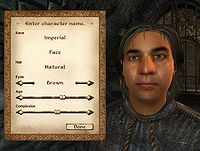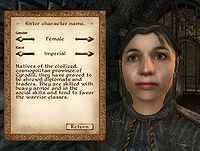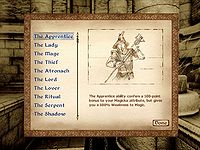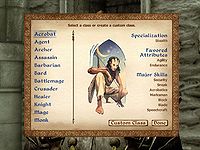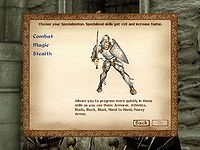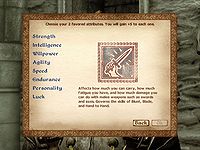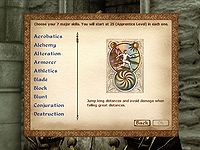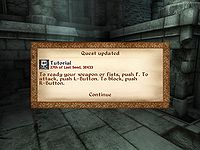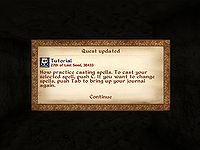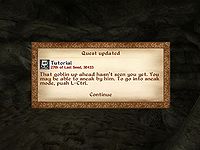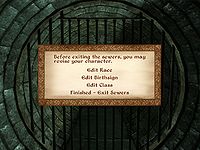Oblivion:Character Creation
Creating your character is the most important decision that you will make during the tutorial, as it affects the entire game. The tutorial is set up to help you make some of these decisions: recommendations are provided for class based upon how you play the first part of the tutorial. (If you are playing the tutorial for the first time, you may want to just accept those recommendations for the time being.) At the end of the tutorial - just before exiting the sewers - you are given one final chance to review every decision that you have made about your character. You may wish to save your game permanently at this point, and spend some time more carefully reviewing the details of your character. As long as you stay in the sewers, you can continue to revise your character.
Contents
General Considerations[edit]
The factors that you must decide upon are:
- Your Race and Gender
- Determines Attributes, skill bonuses, and special abilities (greater powers, lesser powers, constant effect characteristics)
- Your Birthsign
- Provides special abilities (typically attribute bonuses or greater powers)
- Your Class - the single most complex decision you need to make.
- One option is to use one of the game's built-in standard classes.
- The other option is to create a custom class, in which case you need to make decisions about specialization, attributes, and major skills.
- Your Appearance and Name
- While largely governed by your choices of gender and race, you can also fine-tune most aspects of your character's physical appearance. These choices have no effect upon gameplay.
- While deciding on your character's appearance, you will also be able to name them. You are free to name them anything you want, but there is a character limit of 15. This choice doesn't affect gameplay.
There is no one "correct" way to make these decisions about your character. Your choices will be determined by your personal roleplaying preferences. Some questions that may influence your choices include:
- What type of combat do you prefer?
- Do you prefer to charge into dungeons, or explore more slowly and stealthily?
- Do you like or hate the lockpicking and persuasion minigames?
- Do you like to visit cities regularly for supplies and services, or do you prefer to play a more self-sufficient character?
- Do you want to play without worrying about character development, or do you want to pay careful attention to every aspect of your character's training?
- Do you want a character that is strong at the start of the game, or later on?
- How many hours do you plan to spend playing Oblivion? In other words, is it worth it to you to spend your first 10-20 hours of gameplay focusing on long-term character development? Or would you rather be completely finished playing after 10-20 hours?
Although logic may dictate some decisions, others may be based purely upon preferences about your character's appearance.
The details on this page are generally most relevant for advanced players. Many players will not need to or want to create an optimal character based on every recommendation on this page. If you find this page too long, or if you don't understand or care about some of the rationales, you can safely ignore the advice and create a character based solely upon gut instinct. New players will probably find the game more rewarding if they just quickly create a character so that they can learn their own gameplay preferences (for example, to be able to answer the questions listed in the previous paragraph). Any character will be completely adequate for initial gameplay; in the worst case, you can turn down the game's difficulty slider to make up for any mistakes. The nuances discussed on this page will become most important once characters reach high levels (greater than 10-15).
Race and Gender[edit]
Race and gender are best determined simultaneously, because both factors influence the starting values of your character's attributes.
Gender is a choice that is likely to be made based upon personal preference (how you like to roleplay, the appearance of your character). Objective considerations are how your character's attributes are modified. Female characters frequently have higher Personality or Willpower and lower Strength or Endurance, though some exceptions exist.
There are ten possible races to choose from: Altmer (or High Elf), Argonian, Bosmer (or Wood Elf), Breton, Dunmer (or Dark Elf), Imperial, Khajiit, Nord, Orc, and Redguard. Personal preference can also play an important role in this decision, since your character's race controls your character's appearance. The objective considerations are:
- Race determines your character's attributes (which are also modified by gender).
- Each race/gender combination has a different height, which affects movement speed. See the Race summary page for more details.
- Race provides initial bonuses to your character's skills. All races get a total of +45 in skill bonuses, but distributed among different skills.
- Each race has certain special abilities, which may be once-per-day greater powers, multiple-use lesser powers, and/or constant effect characteristics (e.g., resistances, weaknesses, magicka fortification, water breathing).
Full details on these characteristics are provided on each individual race page; a table summarizing the attributes and skills is provided on the Race summary page.
Most of the races have a combination of attributes, skills, and special abilities that make the race naturally suited for certain character types (as detailed under Character Types).
A secondary consideration when choosing your race is that the racial powers and racial constant effects can provide access to spell effects that can then be used to create custom spells or custom enchanted items. In most cases, standard spells can be bought, providing access to the same spell effects. Some exceptions are:
- The Orc Berserk power includes a Drain Attribute effect (specifically, Agility). This is one of only three ways to obtain access to the Drain Attribute effect.
- Several races include a constant Resist Disease effect; this is one of the few ways to obtain access to the Resist Disease effect. These races are Altmer, Argonian, Bosmer, and Redguard.
- Argonians can breathe underwater.
- Two races include a constant Resist Element effect; this is one of the few ways to obtain access to a Resist Element effect. These races are Dunmer (Resist Fire) and Nord (Resist Frost).
- Two races include a constant Resist Poison effect; this is one of the few ways to obtain access to the Resist Poison effect. These races are Argonian and Redguard.
Generally, the benefit conferred from access to these spell effects is not significant enough for these racial powers to be dominant factors in choosing your character's race.
Birthsign[edit]
There are thirteen possible birthsigns, each of which bestows a special ability. There are three main types of birthsigns: those that provide constant-effect attribute bonuses; those that provide constant-effect Magicka bonuses; and those that provide powers, which can be used once per day (in the case of greater powers) or cast multiple times per day using the character's Magicka (in the case of lesser powers). The strongest bonuses are accompanied by offsetting weaknesses.
The birthsigns that provide constant effect Attribute bonuses are: Lady, Steed, Thief, and Warrior. Because you do not have to remember to use these constant-effect bonuses, they require the least effort to be made useful. They are most useful early in the game (by using efficient leveling, you can get your two most important attributes to 100 by level 15, whether or not you use a birthsign bonus). Thief is noteworthy for providing a +10 bonus to Luck; this is one of only two ways to augment your character's initial luck.
Constant-effect Magicka bonuses (in order of increasing bonus) are provided by: Mage, Apprentice, and Atronach. The higher Magicka bonuses are balanced by weaknesses, making them less conservative choices. As with the attribute bonuses, little effort is needed to take advantage of these birthsigns. The extra Magicka bonuses are useful throughout the game, even for high-level characters. Even the smallest Magicka bonus (+50 from Mage) is equivalent to +25 Intelligence.
The birthsigns that provide once-per-day greater powers are: Lover, Ritual, Serpent, Shadow, and Tower. These bonuses are most useful if you are likely to remember to use these powers regularly - if you always forget to take advantage of them (or are afraid to use them in case you might need them later in the day), these birthsigns are relatively ineffective. Most of the powers are most useful early in the game; later in the game, your character can generally learn spells or make potions that are at least as powerful as the greater powers. There are also Doomstones that can be discovered and provide greater powers that in many cases can replace the birthsign bonuses.
Two birthsigns provide a lesser power: the Lord (Blood of the North) and the Ritual (Blessed Word). Lesser powers can be used as many times per day as desired, but carry with them a magicka cost (albeit a small one).
Another consideration with the greater/lesser powers is that these powers provide access to spell effects that can then be used to create custom spells or custom enchanted items. In most cases, standard spells can be bought, providing access to the same spell effects. Some exceptions are:
- The Tower's Tower Warden power is a Reflect Damage effect. This is the only non-Shivering Isles way to obtain access to the Reflect Damage effect (although only custom spells - and not custom enchantments - are possible even then). If you have the Shivering Isles expansion, it is also possible to get a reflect damage spell while Rebuilding the Gatekeeper.
Standard Classes[edit]
The game comes with twenty-one predefined standard classes, which provide a quick way for players to set up a character. One will be suggested for you during the tutorial. Unlike in previous chapters of The Elder Scrolls, this will be determined by what skills you have used up to that point, rather than a series of questions. Some of the classes focus on a single one of the three specializations; other classes combine elements from two or more specializations. Therefore, it should be possible to find a class to cover most standard styles of gameplay.
However, none of the standard classes are ideal. For example, there are actually no classes that exactly match the prototype character types presented below for fighters or thieves. Players interested in efficient leveling or otherwise controlling their character's development will not find any suitable standard classes. Custom classes are necessary to provide complete control over the character creation process. Also some classes (like Warrior, Knight or Barbarian) uses multiple weapon skills (Blade+Blunt+Hand-to-hand). Since you probably won't be actively using more weapon types in combat, the rest of these skills will be scarcely used, making leveling the character slower.
There are 5460 different character combinations without making a custom class. So remember, no pressure! There is a character combination for everybody's needs.
Custom Class Specialization[edit]
There are three schools of skills: Combat, Magic, and Stealth. Each school has seven associated skills - when you select a school to be your class specialization, all seven skills receive an initial +5 level bonus. (Note: the manual incorrectly states that you get a +10 bonus.) These skills also increase more rapidly than other skills.
Custom Class Favored Attributes[edit]
Two attributes can be chosen as favored attributes, and these attributes each receive an initial +5 bonus.
In general, these attribute bonuses are most useful early in the game; a +5 bonus to two or three attributes is possible each time you level up if you level efficiently, so the initial favored attribute bonus can be considered equivalent to an initial one level bonus. The maximum value of any attribute is 100, regardless of whether it received any initial bonuses.
Two attributes behave slightly differently, however:
- Luck can only be increased by +1 each level, so an initial +5 bonus in Luck is more comparable to a five-level bonus than a one-level bonus. Also, Luck is a particularly useful attribute early in the game, so investing in a Luck bonus can be very advantageous, especially to well-rounded characters.
- Endurance determines your total Health: base health is two times endurance. In addition, each time you level up your Health increases by an amount dependent upon your Endurance. The Health bonus each time you level is not retroactively increased if you later increase your Endurance. Therefore, increasing your Endurance early on is important in giving your character the maximum possible Health.
One attribute that in general should not be chosen for your class attribute is Personality, as it is particularly weak. Of the three skills it governs, two provide no benefit in combat or survival (Mercantile and Speechcraft) and the third (Illusion) is not improved in any way by increased Personality. Only those who plan on roleplaying their character with a strong personality should pick this.
Custom Class Skills[edit]
The most important part of creating a custom class is choosing the seven major skills. These major skills start out at values of 25 instead of 5 (before any racial or specialization bonuses). Major skills also increase more rapidly than other skills. The most rapid advancement is in skills that are both major skills and in the class specialization.
The other aspect of major skills is that advances in major skills determine when your character's level increases. Whenever your major skills have improved by a total of 10 points, your character levels up. This feature alone makes character creation difficult: depending upon whether you like to level up quickly or whether you prefer to control your character's level, creating your custom class will be fundamentally different.
A secondary consideration is that starting spells are made available for any magic skill that is chosen to be a major skill. These spells are summarized on the individual skill pages, and are also noted on the Spells page. These spells are in all cases standard spells that can be bought from spell vendors. However, getting them for free saves some money and bother in tracking down spells before you can even start training the skill.
Most Used Skills[edit]
The first step in deciding which skills should be major skills is determining which skills your character is likely to use the most often. (Whether the most-used skills should be major skills or minor skills depends upon your style of play, as discussed in Custom Classes, but in either case identifying the most-used skills is a necessary step). The most-used skills will largely be determined by the overall type of character you choose to play as. Some suggestions on sets of skills are provided in the next section.
Oblivion does not restrict what skills any character can use. Any character can develop any skill to 100 given enough time and effort. Therefore, selecting your character's most-used skills does not imply that the other skills will not or cannot be used. However, the strongest characters will start by focusing on a few skills and developing those skills the most rapidly. For example, a character with 100 in one combat skill (e.g., Blade) will be a much more powerful opponent than one that has developed five different combat skills equally, since each will only have skill levels of 50 at the same point in the game.
- Offensive melee skills, that directly disable enemies at close range: Blade, Blunt, and Hand to Hand. The evasion behavior and long range attacks of enemies such as Conjurers make the Speed attribute desirable for melee characters.
- Offensive ranged skills, that disable enemies from a distance: Destruction and Marksman.
- Defensive skills, that prevent damage from enemies: Light Armor, Heavy Armor, and Block. Alteration's Shield spells and Mysticism's Reflect Damage and Spell Absorption spells can be used at the same time as or in lieu of light or heavy armor.
- Restoration spells can be either a replacement for or merely an addition to damage prevention; however, such healing spells are not cheaper than Potions of Healing if the player uses Potions of Sorcery to cast them, unless they are spells that heal over time.
- Evading attacks is the penultimate damage reduction: a missed attack equals no damage at all. Oblivion is quite generous to the player with the range of enemy melee attacks; the animation of attacks and the actual distance within which enemies can do damage are closely synchronized, so dodging attacks is an option for the player. The Speed attribute, and to a lesser extent the Athletics skill, increases movement speed, and Acrobatics increases the height and distance of jumps; both aid in dodging attacks.
- The ultimate damage prevention is to not be attacked in the first place: Conjuration spells summon creatures to take damage instead of you, and the Illusion effect of Invisibility ensures that enemies can only attack the summoned creature. A character of a given Conjuration level will summon creatures that are weaker than a character of the same level of combat skills, so this approach requires patience and preparation.
There are some other game abilities where there are two different skills that can be used to provide that ability; it is worthwhile to choose which skill your character will rely on.
- Opening locks: lockpicking or Open spells (Alteration) can both be used.
- If you (the player, not the character) are good at the lockpicking mini-game, it is possible to open even Very Hard locks from the start of the game.
- Open spells do not require mastery of any mini-games, but the level of lock you can open is strictly controlled by your Alteration skill.
- Open spells do not work underwater, so being able to fall back on lockpicking is necessary in a small number of cases.
- At level 10 and above, the player can obtain the Skeleton Key, at which point lockpicking skills are not required at all, other than to speed up the lockpicking process. The player can decide whether this removes challenge from their game or not.
- Increasing NPCs' dispositions: Speechcraft or Charm spells (Illusion) can both be used.
- Speechcraft is overall a less useful skill than others, as the maximum disposition available via Speechcraft is limited. There are no additional effects outside of maxing disposition and changing NPC behavior. Many alternatives and enhancements are available, notably Illusion's Charm, Command, and Frenzy spells.
- Illusion, by contrast, also has combat (e.g., Paralyze) and stealth (e.g., Chameleon) effects. Its spells affecting NPC behavior can be tailored with spell-making to fit the requirements of the situation.
Controllable Skills[edit]
Another factor in selecting skills is whether or not it is easy to control when and where your character uses a skill. In particular, if you are interested in efficient leveling, it is important to not accidentally level up because your character is forced to use a skill.
Some skills that you typically cannot control the use of are:
- Acrobatics: You gain acrobatics experience particularly quickly if you fall down a slope or need to jump down a level.
- Athletics: Athletics experience is gained whenever you run, so it tends to go up continuously.
- Restoration: Even for characters who don't rely upon spells for healing, there can be times when you will really need to cast a restore health spell.
Skills that are not used in combat (in other words, that you will not need to count on for character survival) are typically easier to control. For most characters, easy to control skills will include:
- Alchemy
- Alteration
- Armorer
- Blade or Blunt, depending on whether or not you use only one of these skills.
- Hand to Hand, if not being used as primary form of combat.
- Light Armor or Heavy Armor, for the same reason as Blade and Blunt.
- Marksman, if you do not normally use it.
- Mercantile
- Mysticism
- Speechcraft
Block can even be considered easy to control, because if necessary you can always opt to fight without blocking.
In the case of magic skills, you can use spell effects of schools you'd rather not level by creating custom spells. For example, a Restore Health 3 points for 5 seconds spell would normally train the Restoration skill. However, if you add a Shield 35% for 5 seconds effect, it becomes an Alteration spell and no longer gives Restoration experience, because the Shield effect has a higher base cost. This will at least double the base cost of the spell, and often raise it past a skill breakpoint (in this case, it turns a Novice Restoration spell into an Apprentice Alteration one), but it's one way to heal yourself in the field if you run out of potions.
Training Skills[edit]
If you plan to use training to increase skills (although remember that at most five skill training sessions can be used per level), you may also want to take into account how easy it is to obtain training in various skills. The Trainers page lists who the trainers are for each skill, but note that some of the trainers have bugs that limit their availability. For training past skill level 70, only one master trainer is available in each skill, and a mini-quest must be completed for each (some of which are more taxing than others).
Character Types[edit]
Corresponding to the three specializations, there are three archetypes for character roleplaying: fighter, mage, and thief. The most important difference between these three character types is the style of combat, but there are also some secondary differences generally associated with each of these characters. This section provides some guidelines on key characteristics of each of these prototypes, and recommendations for the races, birthsigns, and classes that are best aligned with each one. These recommendations are intended primarily as guidelines for players starting out - as you play the game you are likely to develop personal preferences that differ from these guidelines.
However, you do not need to choose a character that strictly falls into one of these three categories. Most people will want to create a hybrid character that combines aspects of the various prototypes.
Fighter[edit]
The fighter relies upon melee combat to attack enemies, and prefers to charge into face-to-face combat. The fighter expects to receive a lot of damage in combat, and relies upon high health, full armor, and blocking skills to survive the damage.
- Races
All three of the following races provide good combat-related greater powers, good Strength and Endurance, and many combat-related skill bonuses.
- Birthsigns
-
- Warrior: +10 Strength and +10 Endurance are useful to any fighter.
- Lover: Lover's Kiss provides a very useful paralyze ability.
- Atronach: The 50% Spell Absorption effect basically renders impotent half the spells cast against you. Very handy when rushing towards mages to break their frail bodies. The stunted magicka isn't as major of an impediment as it is on any more magically inclined class.
- Lord: Provides a powerful healing spell which can be used multiple times; this is very useful in combat situations. If you're not handy with magic, it will take a very long time before you have the ability to cast an equivalent healing spell.
- Lady: The Fortify Endurance and Willpower are very useful, and the increased health is great especially at early levels.
- Ritual: Mara's Gift can prove highly useful, especially due to a fighter's weak self-healing capability. Blessed Word is decent for crowd control in a pinch.
- Attributes
-
- Strength: Maximize damage dealt with melee weapons. Provides enough Encumbrance to be able to carry a full suit of heavy armor.
- Endurance: Maximizes Health so you can survive enemy attacks. Also improves Fatigue.
- Skills
-
- Blade or Blunt: Choose one of these two as your primary weapon for attack. Most characters will only need to specialize in one.
- Heavy Armor: A full suit of heavy armor provides the maximum armor rating and also provides the most durable armor (it will break down less quickly during combat, and therefore provide the maximum armor rating for longer).
- Block: Extra defense.
- Armorer: Your weapons and armor will sustain major damage; being able to repair them in the field is vital.
- Restoration: Even with armor and blocking, you will be taking a lot of damage. You might as well put to use what Magicka you have to heal yourself.
Mage[edit]
The mage relies upon magical attacks. Because armor negatively affects spell efficiency, the archetypal mage will not wear any armor. Instead, the mage will try to avoid the center of combat, use decoys to detract attention, and generally avoid taking any damage.
- Races
-
- Breton: Enhanced Magicka; good Intelligence and Willpower; good magic skill bonuses.
- Altmer: Enhanced Magicka; good Intelligence and Willpower; good magic skill bonuses. Compared to the Breton, the Altmer has better Magicka balanced by more weaknesses, making it the less conservative choice.
- Dunmer: Summon Ancestral Guardian Greater Power; moderate Intelligence; some magic skill bonuses. Not the best choice for a pure mage, but can be good for more well-rounded mages.
- Argonian: Female Argonians start off with good Intelligence and both genders have a bonus in some of the magic skills such as Illusion (+5) and Mysticism (+5).
- Birthsigns
-
- Mage: +50 Magicka. Without any negatives, this is the most conservative choice for a mage.
- Apprentice: +100 Magicka, balanced by 100% Weakness to Magic. This is a more aggressive choice for a mage. Best paired with the Breton race, to reduce some of the weakness to magic.
- Atronach: +150 Magicka and 50% Spell Absorption, balanced by Stunted Magicka. An Atronach character can be very powerful, but requires many specialized strategies to be effective.
- Standard Classes
-
- Mage (the archetypal mage class)
- Battlemage
- Healer
- Sorcerer
- Spellsword
- Witchhunter
- Attributes
-
- Intelligence: Maximize Magicka, enabling more powerful spells and more back-to-back spells.
- Willpower: Maximize Magicka regeneration rate, enabling more spells to be cast in a short period of time (not very valuable for players born under the Atronach birthsign, as their Magicka won't self-regenerate).
- Skills
-
- Destruction: The primary attack skill for a mage.
- Conjuration: Summon monsters to distract your enemies, deal additional harm, and prevent them from attacking you.
- Alteration: Shield spells provide a replacement for armor; open spells and feather spells are also valuable to compensate for mage weaknesses.
- Illusion: An often overlooked school, illusion provides many alternatives to direct attack upon enemies.
- Mysticism: Spell Absorption and Reflect Spell are alternative ways to replace armor.
Thief[edit]
The thief relies upon sneak attacks and avoids face-to-face combat as much as possible. Sniping from hidden corners - often using a poisoned bow - is a primary means of attack.
- Races
-
- Bosmer: Good Agility; great stealth skill bonuses.
- Khajiit: Unlimited Night-Eye; good Agility; good stealth skill bonuses.
- Argonian: Male Argonians start out with good Agility and Speed; they also have a good initial Security bonus.
- Dunmer: Good Speed; bonuses in Blade, Light Armor, and Marksman are useful for thieves.
- Birthsigns
- Attributes
- Skills
-
- Sneak: The primary skill for avoiding combat, getting sneak attack bonuses, and generally staying undetected.
- Marksman: Usually the primary combat skill for thieves, allowing targets to be killed from a distance.
- Blade: You probably won't be able to get by on just Marksman in some cases, particularly with faster opponents and in close quarters, so it's good to have a melee attack handy. Short blades - such as daggers - are very fast, and melee strikes receive a better sneak attack bonus than a bow.
- Alchemy: Create powerful poisons to increase the potency of your attacks.
- Light Armor: Light armor is the traditional armor type for thieves. However, the primary disadvantage of heavy armor is its weight (heavy boots are also a disadvantage for low-level sneaking); if your character is strong enough, heavy armor can also be a good choice.
- Security: Break into houses and other places with loot. (Alteration, providing Open spells, can be considered as an alternative).
- Illusion: Invisibility/Chameleon will help you remain unseen, and Command/Calm/Demoralize spells will keep you out of face-to-face combat.
- Mysticism: Although often overlooked by thieves, Detect Life goes with Sneak like bread and butter, and Telekinesis can be used to move owned items out of NPC sight for safe stealing.
Hybrid Types[edit]
Most characters will not fall strictly into one of the above three archetypes. In some cases a few skills from one specialization will be added to another, but a more extensive merging of different specializations can be done.
Rather than expend Magicka by using spells to directly attack an opponent, you can cast spells to augment your melee-fighting skills in a variety of ways.
-
- Restoration spells can absorb someone's skill in Blade, Blunt, or Hand to Hand, which enhances your own combat damage while weakening theirs.
- Destruction spells can make an opponent more vulnerable to elemental or poisoned attacks delivered by an enchanted melee weapon, shortening the melee battle. The defining principle is to use your magic skills to make your 'good' melee skills even greater, rather than switching back-and-forth between two merely 'good' specializations.
A mage who makes him/herself more resilient through the use of Armor and Endurance can stand toe-to-toe with an enemy and deliver spells cast at Touch range instead of a standoff distance. Spells that are Cast on Touch rather than Cast on Target are more Magicka-efficient.
-
- A spell of similar power can be cast more often in one barrage, since it drains less Magicka per cast, or you can use a more powerful touch spell at the same Magicka cost of a ranged spell.
- The additional defense afforded by a shield requires such a player to wield a one-handed weapon, even if they do not intend to use that weapon as a primary method of attack. As a result, such a weapon can be used to increase the effectiveness of the mage's magical attack, by being enchanted with something like Absorb Magicka or Weakness to Magic. Again, the player uses the skills of one specialization to make the skills and powers of another specialization even greater, rather than having two independent specializations compete for your attention.
A fighter can also benefit from stealth. Opening battles with a sneak attack conserves resources that might be needed later in the dungeon, such as potions. Or the ability to steal weapons from enemies to decrease their ability to fight effectively.
Stealth characters can benefit from magic as well.
-
- 10% Chameleon makes a poor sneak better and a good sneak almost undetectable.
- Open locks under the nose of guards with a ranged Open Lock spell.
- Chasing off heavy guards with an area effect Demoralize spell, getting you in undetected.
- Telekinesis lets you snatch items in plain view simply by moving them where they can't be seen to be picked up.
- Frenzy spells can create diversions, either making guards fight one another, or citizens attack each other forcing guards to intervene and leave their post.
Character Development[edit]
Your character creation choices will have an influence throughout the entire game. This section summarizes some of the different points in the game at which your initial character creation will make a difference.
Initial Strengths[edit]
Your character creation choices obviously have an immediate effect upon the starting values of your character's skills. Skills that you choose as a major skill will start at Apprentice level (with any Apprentice level mastery perks) instead of Novice level. Your ability to perform those skills will be noticeably better. By combining racial bonuses and specialization bonuses, it is possible to start some major skills at 40, so relatively little training will be necessary to reach Journeyman level and acquire the Journeyman level mastery perk.
Leveling[edit]
As you use your major skills, those skills will improve and contribute towards leveling up your character. If you choose major skills that you use a lot, your character will rapidly increase in level. On the other hand, if you choose major skills that you rarely use (or can control the use of), your character will increase more slowly in level. This choice between fast leveling and slow leveling represents a choice between two fundamentally different ways of playing the game.
Maximum Character Level[edit]
There is a maximum character level which is determined firstly by your attributes and secondly by the initial values of your major skills. Once your attributes all reach 100 you reach your final level. This is highly unlikely before all your major skills also reach 100, at which point you will not gain any more levels. However, there are still ways to gain level-ups after this which involve lowering your major skills and your attributes (see below). Character Creation Tools can be used to determine your character's maximum level.
To maximize your character's final level as determined by major skills, you want to avoid any initial skill bonuses to your major skills: make sure that all specialization skills are minor skills, and make sure that racial bonuses all apply to minor skills. In other words, make your major skills all start with a value of 25 (you can actually allow one of the seven major skills to start at 30 without decreasing your maximum level). In that case, your character's maximum level will be 53. At the other extreme, if all skill bonuses are applied to your major skills, your character's maximum level will be 45.
You can further raise your character's maximum level to 79 by training in a major skill 5 times per level, this must be done in combination with a drain skill spell to enable training of the major skills beyond level 100 (which also lowers the cost of training).
Some ways to lower your major skills include:
- Going to jail and losing skill points in major skills (one in three or lower chance) allows your character to train those skills again and gain extra levels. You can go to jail as many times as desired, which effectively removes major skills as a determining factor on your maximum level.
- Get skill boosts as quest rewards when your skill is already at 100. The reward will make your skill go over 100; although this has no effect in most formulas (e.g., damage calculation), you will get extra "level" points. For instance, with the Oghma Infinium, you can get up to 3 extra level-ups, if you choose skills that are all major skills.
- Using a skill that you have already leveled up to 100, make yourself a spell that drains that effect by 100 for 1 second on self. Find any trainers with that skill, cast your new spell, and have them train your character. This can theoretically be used to level any skill up to 200 (or 255 using spell stacking) using a master trainer. However, you may find this difficult to do unless you are only focused on it because you can only train 5 times in a single level.
On the other hand, you may reach an earlier maximum level if you are able to get all eight attributes to 100 before reaching the skill-based maximum level. Once your attributes are maximized (100), no more level-ups will occur. To maximize your available levels make sure to choose a birthsign without an attribute bonus. All races and classes leave you with 470 points to fill in your attributes, and if you only level your attributes by one point each per level with extreme inefficient leveling, your maximum level is 204 (or 207 as a female Orc). If doing this make sure to leave at least two major skills untouched per level (luck would be the third attribute then). In addition, it is also necessary to leave one attribute at 30 (Personality at 25 for the female Orc) and untouched, so when all the other attributes are at 100 you have another 70 (75) levels available. However, it is impossible to reach that high a level without going to jail many, many times to continually lower your major skills, and as noted below, not beneficial in any meaningful way, and it is possible to maximize your attributes by level 40 through efficient leveling if that is your aim.
The only way to lower your attributes to allow leveling is with the Shivering Isles expansion. With it you can pick up an addiction to felldew that will drain seven of your attributes by 10 to 15 levels, giving you additional level-up opportunities. With a total of 90 attribute points drained, this gives the potential for another 40 levels increasing the maximum level to 244 (or 247 as a female Orc).
On the PC, a workaround is to use the Console to decrease one of your attributes, for example by entering
modpca personality -1. If you can anticipate that this is going to occur, a more general workaround is to avoid +5 attribute bonuses on the last couple of attributes that need to be increased (e.g., Personality).
For many players, the character's maximum level will not be a significant factor. Level 45 is easily high enough to maximize all the leveled lists used in the game; leveled lists top out in the mid-20s. Also, a level 45 maxed-out character is almost as strong as a level 53 maxed-out character; the main differences will be total Health and potentially the character's Luck attribute. In short, there are only inconsequential benefits associated with being able to increase your character's maximum level from 45 to 53. Other notable levels are 35, at which point all leveled items will be at their maximum; and 22, at which every item in the game is available.
Custom Classes[edit]
Most Used Skills as Major Skills[edit]
The most obvious way to set up a custom class is to set the major skills to be your character's most used skills. This is how the developers intended classes to be designed, based on the descriptions of the standard classes. The official game guide also proposes custom classes based on this assumption.
There are several advantages to choosing major skills that are frequently used:
- Those skills start at Apprentice level, and can even be at nearly Journeyman level.
- Your character will rapidly gain experience in those skills, and will quickly acquire access to the higher skill perks.
- Your character will level up more rapidly, gaining access to higher health, better equipment, more gold, and all the other bonuses that come with leveling.
- Leveling up occurs without any special effort.
The major disadvantage of this approach is that the character may level too quickly, especially if the bulk of your major skills do not directly improve your combat skills. Since monsters and enemies get harder as your level increases, custom classes that improve non-combat skills may find that monsters begin to outpace their characters. For example, a character with an ever-increasing Blade and Heavy Armor skill will have little problem with stronger monsters, but a character with an ever-increasing Alchemy and Sneak skill will inevitably find monsters that require stronger combat skills than they have. On the other hand, such a character could undoubtedly use non-combat approaches for many such situations.
Least Used Skills as Major Skills[edit]
Gaining the maximum attribute bonus from each level is a sure way of maintaining a powerful character in a game where all monsters become more powerful as your character gains levels, rather than a few powerful monsters being located somewhere that can be avoided until the character is ready to face them. In order to stay stronger than the monsters, it is necessary to level at will, rather than by accident; this can be expedited by intentionally avoiding picking major skills that are uncontrollably leveled, such as Athletics, and choosing instead those for which there are substitutes. For example, even Blade can be a "least-used skill", because a Blunt weapon can be used instead to avoid level-up.
The skills most likely to level up out of control, gaining the tenth Major skill increase before the ten Major/Minor increases in each of the attributes of choice, are the aforementioned Athletics, and Acrobatics. Mercantile is effectively uncontrollable in Oblivion (it levels, albeit slowly, whenever the player makes a transaction, whereas in Morrowind it only did so when the player modified the buying or selling price). Major skills that are crucial to the completion of quests can require being ready with a substitute, e.g., Alteration unlocking spells can be used instead of Security, to get past locks that block critical paths in quests or irreplaceable loot, and Charm spells, bribing, or scrolls can be used instead of Speechcraft, when quests require persuading an NPC, or taking time out from quests to level up. For more on the importance of gaining maximum attribute bonuses and the means to achieve them, see Leveling, particularly the section The Leveling Problem.
Drawbacks of this strategy include: it is time consuming at low levels (although this is to be weighed against the savings in time of easier fights at higher level), and your character's key survival skills all start at Novice level, making for a steeper learning curve (to be weighed against the benefits of an easier mid- and late-game).
One Major Skill for Each Attribute[edit]
Another strategy used to design a custom class is to choose one and only one major skill that is governed by each of the seven attributes (other than Luck, which governs no skills). This enables maximum control over the attribute bonuses that you gain each level; it minimizes over-leveling of skills, as part of the ten major skills leveled can always be in a desired attribute or attributes.
Some compromises need to be made between this strategy and Least Used Skills as Major Skills, in its strictest definition. Many characters will have three most used skills that are all governed by the same attribute. For example, fighters are likely to rely on all three Endurance skills (Armorer, Block, and Heavy Armor). Mages are likely to rely on all three Willpower skills (Alteration, Destruction, and Restoration). However, if least used skills are defined as optional skills, then it can be seen that, for example, NPC smiths can be used to repair armor, dodging backwards can be used to avoid enemy blows (which incidentally is a 100% damage reduction), and Light Armor leveled concurrently can be used if leveling Heavy Armor is not desired. These are not, of course, the most optional of skills, nor preferred options; the point is that it is only having to level a particular Major skill that leads to uncontrolled character leveling, not the fact that the player might use it.
- One option is to choose the least important of the three skills and make that a major skill. That one skill is likely to dictate when your character levels up, at least for the first few turns, but leveling will still be relatively slow and controllable.
- Another option is to keep all the most used skills as minor skills, and instead choose two major skills associated with an attribute, such as Personality, that comes into play less often.
- The disadvantage in this case is that because 2/3 of the available skills for that attribute are major ones, obtaining +5 attribute bonuses for the doubled-up attribute are more likely to interfere with, or be interfered with by, gaining the full attribute bonuses of other major skills.
- For example, if both Mercantile and Speechcraft are chosen as major skills, to get +5 bonuses in Personality requires one major skill point in Mercantile or Speechcraft for every point less than ten in Illusion. Every point in Mercantile and Speechcraft is, in turn, preventing a point in other, more crucial major skills. This is not likely to be a problem in itself, but it can exacerbate other problems. For example, a player with Athletics, Restoration, and their preferred weapon as major skills can all too easily get three points in each. If the player also has Marksman and Sneak as majors, then to get a +5 Agility bonus, they would then be stuck with having to get nine points in Security, which might well be impossible without getting a point in Athletics, Restoration, or the weapon skill first.
Combined Example[edit]
Jane decides to make a character primarily relying on Speed and Agility to run around murdering folks. She makes the conscious decision not to worry about having higher maximum level, but does want to level as efficiently as possible.
She chooses Endurance and Luck as favored attributes.
She chooses a male Argonian - high Agility and Speed, and low Personality, are all very appropriate. She also chooses the Thief birthsign, as it combines well with her other choices.
For her major skills, she chooses one per attribute:
- Agility: Security - she will use Alteration instead, when necessary.
- Endurance: Armorer - she will hire people to repair her stuff for her when necessary.
- Intelligence: Alchemy - she can buy or steal any potions she desperately needs.
- Personality: Speechcraft - she will use Illusion instead, when necessary.
- Speed: Light Armor - she will use Heavy Armor or no armor instead.
- Strength: Hand to Hand - she'll rely on murdering her foes with actual weapons.
- Willpower: Destruction - she can use melee weapons and bows, so she'll get by.
She chooses the Stealth specialization; this specializes her in 3 of her major skills, so that when she does decide to level, those, at least, will level very quickly.
The resulting character has maximum level 44, and starts out surprisingly competent at everything, due to such a high Luck.
Skills vs. Attributes: Which Is More Important?[edit]
As you probably know, Strength directly affects melee damage while Agility directly affects bow damage. However, these effects are not as great as you might think.
Damage multiplier for character with Strength 30
.75 + 30 * .005 = 0.9x
Damage multiplier for character with Strength 70
.75 + 70 * .005 = 1.1x
So, an exceedingly weak character with a strength of 30 does 82% of the damage of a very strong character with a strength of 70. Nothing to sneeze at, but let's compare it to weapon skill.
Damage multiplier for character with weapon skill of 30 (e.g., Blade)
.2 + 30 * .015 = 0.65x
Damage multiplier for character with weapon skill of 70 (e.g., Blade)
.2 + 70 * .015 = 1.25x
An unskilled swordsman with a Blade skill of 30 does 52% of the damage of a skilled swordsman with a Blade skill of 70, a much bigger difference.
Conclusion[edit]
Skill gains are over 1.5 times more effective at increasing combat damage than Strength and Agility attribute gains. If you are trying to create an optimal fighter or archer, favor skill bonuses over attribute bonuses when selecting race.
For example, a male Khajiit gets a +5 bonus to his Blade skill and has a starting Strength of 40. A male Orc gets no bonus to his Blade skill, but has a starting Strength of 45. All other things being equal, take a look at the damage multipliers below.
Khajiit with Strength 40 and base Blade skill of 30
Khajiit Strength multiplier
.75 + 40 * .005 = 0.95x
Khajiit Skill multiplier
.2 + (30 + 5 bonus to Blade skill) * .015 = 0.725x
Khajiit combined multiplier for Strength and Skill
.95 * .725 = .689x
Orc with Strength 45 and base Blade skill of 30
Orc Strength multiplier
.75 + 45 * .005 = .975x
Orc Skill multiplier
.2 + 30 * .015 = .65x
Orc combined multiplier for Strength and Skill
.975 * .65 = .634x
The Khajiit will do about 9% more damage than the Orc due to the +5 Blade bonus over the +5 Strength bonus. There are many other reasons that an Orc might end up being a better fighter than a Khajiit, but his higher Strength is not one of them.
Character Changes During the Tutorial[edit]
There are some interesting details about how character changes are implemented during the tutorial. In particular, changes in character class can have some unexpected side effects.
During the tutorial, the game fundamentally keeps track of how many experience points you have gained in each skill, not how many skill levels you gain. When you change your class (either when Baurus asks you to select a class, or at the end of the sewers), the game recalculates how many actual skill levels that experience corresponds to (counting up from the skill's base value, taking into account whether it is a specialization and/or a major skill). For example, you could increase Blade 9 points, from 5 to 14, during the tutorial. But if you then select a class where Blade is a major skill, that can become just a 3-point skill increase, and you end up with Blade at 28. Therefore, there is no inherent advantage from training skills during the tutorial; the amount of work necessary to improve skills is identical to that required after the tutorial is complete.
If you have gained enough experience to advance to Apprentice, Journeyman, or even higher skill levels during the tutorial, all of the skill advancement screens will be shown each time you change your character, as the game recalculates all of your skill levels. It is possible to lose skill perks in the process (especially if you train skills extensively late in the tutorial), but it is also possible to gain extra skill perks.
For those who like to squeeze every possible advantage from the game, there are some interesting possibilities at the end of the tutorial. Before leaving the sewers, you can change your race, birthsign, and class as many times as you like. Each time you make a change, the game recalculates all of your skill levels. (This can in turn affect whether or not you are ready to level up, and all of the attribute bonuses that appear when you level up.)
One possibility is training Conjuration. Many characters will primarily want to use Conjuration to summon creatures. However, starting at Novice level, no summon spells are available. So you have to waste your valuable gold on a spell like Bound Dagger, just so you can practice it and reach Apprentice level. Another option is to train Conjuration while still in the sewers. Change your character to a High Elf Apprentice (to max out your Magicka), and choose a class with Conjuration (e.g., Sorcerer). You will now have a Summon Skeleton spell available. Chain-cast that spell until you have gained 15-20 skill points, ignoring the level-up message that occurs. Now change your character back to your desired configuration. The Summon Skeleton spell does unfortunately disappear, but your character will now be Apprentice level in Conjuration, so you can immediately start using summon spells. Also (unless you trained other skills) the level-up icon will disappear.
It is wise to save game right before exiting the sewers so you can load this save in the future, changing your character upon leaving, without doing entire tutorial again.
Face Generation[edit]
An easy way to obtain a face is to keep selecting "Random" for the facial features. When you have a face you like, you can fine-tune it from there. However, making a face that one is happy with can be a daunting task. This is primarily due to illumination issues in the game world at the two instances where you are normally able to edit facial features. Features such as skin tone (texture) and hair color can be difficult to see clearly in poor lighting and may look unappealing in better lighting.
After the introductory movie, you are afforded the opportunity to edit the facial features under somewhat neutral lighting conditions. The second instance, where you may repeat the procedure before finally exiting the first dungeon, is troubled by lighting . The face is severely overexposed making it difficult to judge the appearance of your character (remember to unequip your torch).
One solution is to examine the face in the inventory screen for a more neutral look. Another solution - for an unmodified version of Oblivion - is to save the game before exiting the sewers, note your character's appearance in neutral daylight outside and re-load and modify the features as needed.
One thing that exacerbates the issue is the lack of feedback on the sliders, which leads to excessive trial and error. When interacting with the sliders, avoid moving the texture-related sliders to extremes, as this may cause unintentional changes to other facial features. These feature changes will not revert as the sliders are returned to less extreme positions, so use care when adjusting the sliders.
Additionally, for PC users, there is a mod that enables numerical feedback on the sliders, thereby allowing for accurate, repeatable testing. This is helpful because the sliders typically range from -1000 to +1000, and it is impractical to count each increment in direction. Knowing the precise location of a slider is important when re-creating the facial features after re-loading the game.
Furthermore, to save time constantly saving and re-loading, (1) save outside the sewers, face the sewer entrance (2) bring up the console and type showracemenu to enable the race screen. The benefit is that it allows examination of the character's face in a neutral illumination setting.
To avoid the blotchy effect that is common when creating a character, change the forehead shape to be tilted all the way forward, then modify the tone of the skin. As soon as you move the slider, the face will appear to snap into a smooth texture without the blotchiness. After that, you can modify the forehead to your desired tilt. Wrinkles may show based on the age slider, so set as young as possible for the smoothest skin. However, this may look unrealistic to an extent. Sometimes the forehead tilt and tone change don't smooth out the character; resetting the character appearance will usually work, although the blotchiness may reappear when you load a saved game.
Furthermore, there are several mods for PC users that offer the ability to import faces from a savegame (Wrye Bash, for example) should one be inclined to adhere to a particular face of one's alter ego.
One tricky thing for people trying to get a good skin they want is the fact that the head's skin may be slightly or significantly different than the skin of the body. This is most noticeable at the bottom of the neck. Things that cause this are unnatural skin tones, Very light/dark beards, complexion, and other things. This is quite noticeable on High Elves and female Redguards. For example, if you look at a High Elf without a shirt on, his/her head will be yellow, while their body is a light peach, like an Imperial's skin.
If you wish, you can alter the face significantly. For example:
The Blue Argonian[edit]
This is a way to give your character an extremely unusual skin color at the face generation screen. This does not involve using glitches or exploits, so your game will not crash or experience any other difficulty. You can use this to give your Orc red skin or even make a blue-skinned Argonian.
You need to go to "Tone" and select "Skin." You will see two sliders there: one for orange/blue and one for purple/yellow. The goal here is to get both sliders to one side of the bar, which is slightly time consuming since moving one will move the other in the opposite direction. Moving both sliders to the left will result in bright reddish-orange skin, while moving both to the right will result in blue skin. This works for any race, including those with naturally odd skin colors like Orcs and Argonians. Here is what you must do:
- Move the top slider all the way to the right.
- Select the bottom slider and move it all the way to the right.
- This will push the top slider to the left, so repeat these steps as necessary until they are both on the right side.
Your character now has blue skin! Use this same trick moving the bars to the left to get a red color.
Achromatic colors such as black and white can be achieved by adjusting the dark/light bar located above the color bar.
Tools[edit]
Due to the plethora of character creation options and the complexity of Oblivion's leveling process, it can be very helpful to use a tool to analyze your choices before creating your character.
FaceGen[edit]
Oblivion's face slider settings were taken from the program FaceGen. As a result the program can be used to convert your actual face into a set of slider settings which can then be used for Oblivion, if you wish to make your character look like you. There is also a mod for the program that adds the Oblivion face models. The full version is not needed for these purposes; the free demo version can be used. Because the output is only a set of slider settings, this will work for any version of Oblivion.
OCP[edit]
The Oblivion Character Planner is a browser-based tool that evaluates the potential maximums of any new or existing Oblivion character. You input all of your new character's choices or existing character's stats and OCP simulates what will happen as your character levels up. OCP then analyzes the results highlighting areas that were suboptimal. When used correctly, you can create a character and a leveling up plan that will allow you to maximize the potency of your character.
